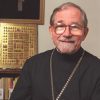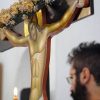The Holy Transfiguration, August 6 (19), is one of the Great Feasts of the Church – but I’ll bet if you asked Americans, “What is the Transfiguration?”, ninety nine out of a hundred would say “Eh?” Or maybe some might think it was the latest super-hero movie. This is our second forgotten Feast.
I’ll bet if you asked Americans, “What is the Transfiguration?”, ninety nine out of a hundred would say “Eh?” Or maybe some might think it was the latest super-hero movie. This is our second forgotten Feast.
The first is the Epiphany (I’ve complained about this before), which gets ignored because it comes after our cultural celebrations of Thanksgiving, Shopping, Santa Claus and Bowl Games, and after all that commotion everybody is just wiped out and poor Epiphany gets lost.
The problem with Transfiguration here in the West is that other Christians don’t seem to emphasize it, so people here rarely hear about it. Also it falls while half everybody is out of town or otherwise mentally “on vacation”. The result, at least at Saint Nicholas, Cedarburg, Wisconsin, is that those who come to Transfiguration Liturgy feel very blessed but also pretty lonesome.
Thus we lose much.
Orthodox theologians have made much of the Transfiguration, and with good reason. Our Lord God and Savior Jesus Christ appears, for the first time, in his heavenly Glory! A wonderful awe-inspiring event which is the key to who he truly is, and what he calls us to become – and so much more.
The Transfiguration of Christ
Matthew 17 begins: “After six days…”. Six days earlier Peter had first confessed, “You are the Christ, the Son of the Living God.” Jesus accepted that title, then immediately told his disciples, to their horror, that he must suffer and die. So the Transfiguration took place in context of these two things: Jesus is Son of God. He must die.
“Six days later he took Peter, James and John with him to the top of a high mountain by themselves.”  Tradition says it was Mount Tabor, six miles southeast of Nazareth, 1300 feet high. (There’s a parking lot below it today.) These three were Jesus’ inner circle who knew him best. This experience apparently was something the other disciples couldn’t handle yet. The Lord reveals his Glory to those who can cope with it – or almost cope with it, as we shall see. Luke’s account says the Apostles were heavy with sleep. Was it nighttime? or were they just weary from the climb? Or sometimes peoples’ reaction to an encounter with the Holy is sleep. When God appeared to Moses in smoke and fire he fell into a deep sleep, a kind of trance. Genesis 15
Tradition says it was Mount Tabor, six miles southeast of Nazareth, 1300 feet high. (There’s a parking lot below it today.) These three were Jesus’ inner circle who knew him best. This experience apparently was something the other disciples couldn’t handle yet. The Lord reveals his Glory to those who can cope with it – or almost cope with it, as we shall see. Luke’s account says the Apostles were heavy with sleep. Was it nighttime? or were they just weary from the climb? Or sometimes peoples’ reaction to an encounter with the Holy is sleep. When God appeared to Moses in smoke and fire he fell into a deep sleep, a kind of trance. Genesis 15
And Jesus was transfigured. The Greek word for this is “metamorphosis (μεταμόρφωση)”. It’s the same word we use in English to describe what happens to caterpillars as they turn into butterflies.
“And his face shone like the sun, his clothes white as light.” We can imagine the disciples waking from sleep, rubbing their eyes, thinking “I’m still asleep. I’m dreaming”, then looking at each other and realizing they were all seeing the same thing. This Man with whom they had walked, talked, laughed, shared meals – now transformed, light radiating from him so they could scarcely bear to look. It’s the first theme of the Feast: Truly this is the Son of God.
And with him two figures, Moses and Elias/Elijah in the light speaking with him, Luke says, about his exodus/έξοδος, his exit which he was to make from Jerusalem. It’s the second theme: his death.
There’s more: Moses, giver of the Law, and Elijah, first of the great prophets. It’s the whole Jewish tradition, the Law and the Prophets, acknowledging Jesus as Son of God. Moses, said to have been taken into heaven because they could not find his body, and Elijah carried up into heaven in a chariot of fire, the two who had been taken into Glory. (Before Christ, most people went down into sheol, hades, the dark place of the dead.) Heaven was proclaiming Jesus as Son of God. It’s the first theme again.
Peter blurted out as usual: “Lord, it’s so good to be here. Let’s make three tents [tabernacles, dwelling places], one for you, one for Moses, one for Elijah.” Let’s keep this, so we can see you in Glory anytime we want. No, Peter. It can’t be done. We can’t hang onto anything in life. C.S. Lewis said the one prayer God never grants us is “Encore!” Whatever good thing God gives us will never happen again, at least not just like that. So don’t try to cling to it. Move on. God will give you another good thing in another way. Or if it’s a bad experience, don’t cling to that either, don’t let it overcome you. Move on. God will send you something else that is good.
Some call what happened to the disciples “mountaintop experiences”. Some Christians are forever trying to recreate their “mountaintop” conversion experiences. In their worship they try to work up the original emotions and feelings. Folks, give it up. Move on. Go keep Jesus’ commands. Care for the least of his brethren. That’s where you’ll find him now.
 Before the three disciples would see him in Glory again, they would have to come down from Tabor, then walk with him towards a different Hill. And later they all would have their own dying to do, till finally they are where they are now, with him perpetually in Glory.
Before the three disciples would see him in Glory again, they would have to come down from Tabor, then walk with him towards a different Hill. And later they all would have their own dying to do, till finally they are where they are now, with him perpetually in Glory.
But not yet.
Too Much for Mortals to Handle
While Peter was still speaking a bright cloud overshadowed them, a cloud such as Moses had seen atop Mount Sinai, a cloud which on the Mount of Olives would take the risen Lord into Heaven. And a voice from the cloud: “This is my beloved Son: in him I am well pleased. Hear him.”
This was suddenly more than the disciples could take. They fell on their faces, overcome, greatly afraid. The appearance of the Holy, even of angels, usually terrifies people. That’s why at such times they need to be told, “Fear not.” “Do not be afraid.” Some time after this (how long? I don’t think they knew) they felt his hand on their shoulders and heard his familiar voice: “Arise, do not be afraid”. They looked up and saw Jesus only – no light, no one with him. They must still have been shaking. But it was the “real” Jesus again, as they had known him.

But no. For a moment they had for the first time seen the Real Jesus – Christ our God in his Glory. The Jesus they had known had been the “hidden God”. In our hymns we sing of Christ’s coming to earth “without leaving heaven”, “without leaving his Father’s side”. All this time, from the moment of his Conception in the womb of the Virgin, Jesus Christ had been not only on earth but also in heaven. All this time he was not only a Man but also “God from God, Light from Light”. Did you ever wonder why we say those words in the Creed? It’s because of the Transfiguration. For just a moment the veil had been lifted and they had seen him as he is. But only for a moment. They couldn’t handle any more. Not yet.
As he led them down the mountain he said, “Tell this vision to no one till the Son of Man has risen from the dead.” It would be like trying to describe blue to a blind man. It’s like trying to describe the Transfiguration or the Resurrection to us who have not seen it! That’s why Orthodox who have mystical experiences rarely speak of them. There’s no point.
And now for the disciples, for a while, life with Jesus went back to normal. But in another way it did not, for it says, “Now he set his face towards Jerusalem”.
Recalling the Transfiguration
In the Epistle appointed for the Transfiguration 2 Peter 10-19 we find Peter thirty years later, soon before his martyrdom which he knows is coming. As he wrote, he was remembering the Transfiguration and what it meant to him. “While I am still in  this ‘tent’” – surely thinking back to the “tents” he had wanted to build on Mount Tabor and could not. He was a young man then. Now he is older and he understands. By now he knows that even his body is a tent, a temporary dwelling place which he won’t keep forever.
this ‘tent’” – surely thinking back to the “tents” he had wanted to build on Mount Tabor and could not. He was a young man then. Now he is older and he understands. By now he knows that even his body is a tent, a temporary dwelling place which he won’t keep forever.
“Before I die”, he means, “I want to remind you [of how] we were eyewitnesses of his majesty. For we received from God the Father Glory and honor when the voice came to him from the Highest Glory: ‘This is my beloved Son in whom I am well pleased’. We heard this voice which came from heaven when we were with him on the holy mountain.”
Peter could never forget. It was the confirmation that he had been right: “You are the Son of the Living God.” He continues, “We have the prophetic word confirmed, which you do well to heed as a light that shines in a dark place till the day dawns and the morning star rises in your hearts.” The Transfiguration was to him “a light shining in a dark place” – this dark place, this dark confusing world where the darkness of death gets us all and casts its shadow over our hearts and minds long before that. …“till the Day comes”, the great Day of our Lord Jesus Christ, “and the Morning Star rises in your hearts”, Christ the Rising Sun. And we will see for ourselves Christ the true Light.
Even more, the Day when Christ will share his glory with us. He gives us, Peter says “an entrance into heaven”, for he is not only true God but also true Man. Jesus Christ is mankind caught up into the Glory. The Transfiguration is a picture of our future, if we will have it – when, in a way we cannot yet imagine, the light of heaven will shine also from within us.
The Apostle John wrote later, decades after Peter’s death. He also was thinking back to the Transfiguration. In his first Epistle, he wrote those words which we Orthodox so often quote: “What we will be has not yet been made known. But we know that when Christ appears, we shall be like him, for we shall see him as he is.” 1 John 3:2.
Brothers and sisters, we also will be transfigured, we also will be glorified, we also will be “metamorphosized”. Jesus Christ will turn us caterpillars into butterflies.  With the Theotokos, whose glorification we will celebrate on August 15 (28), we also are to become gods and goddesses, “more honorable than the cherubim, more glorious beyond compare than the seraphim”. As Saint Athanasios wrote, “God became Man so that man might be deified.”
With the Theotokos, whose glorification we will celebrate on August 15 (28), we also are to become gods and goddesses, “more honorable than the cherubim, more glorious beyond compare than the seraphim”. As Saint Athanasios wrote, “God became Man so that man might be deified.”

















